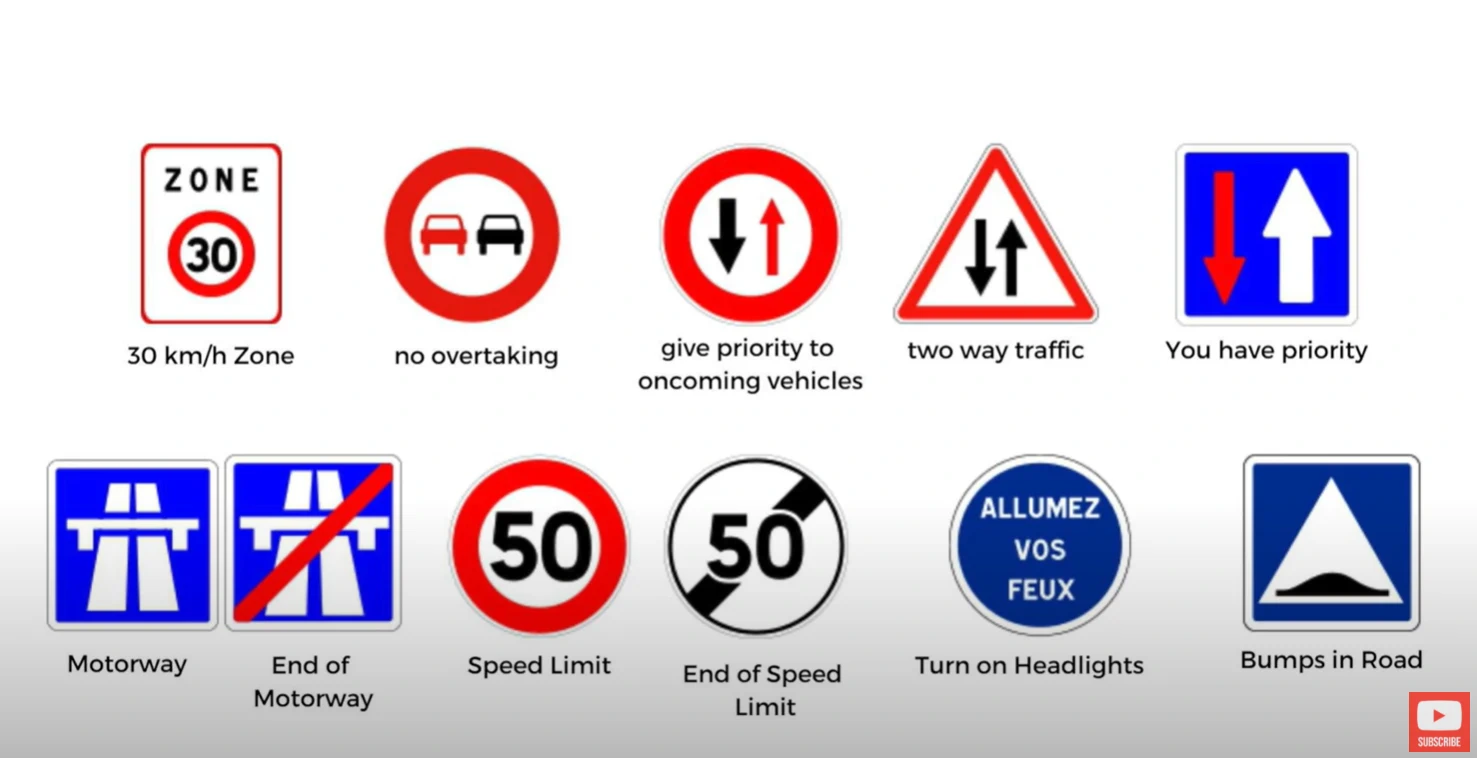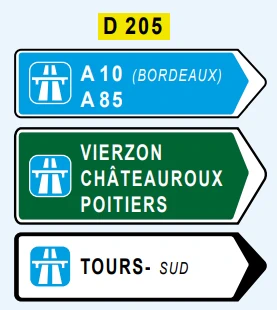by Celeste Lipford and Terry Lipford - last updated on 6/5/2025
Driving a vehicle in France is not quite the same as it is in the United States. We have collected some information and details that we found useful to know while driving in France. We will start with road signs and then on to other information you will want to have.
Please note: If you're American or Canadian, your passport and driver's license are all you need to drive in France. Many sites will tell you that you need a notarized French translation of your U.S. Driver's License - however - we have been renting cars in France for over 30 years and we have never been asked for such a thing. Many sites will also tell you that you need an International Driving Permit however, we have never had one and have never been asked for one at any Auto Rental Facility. From what we have read, if you were to be stopped by the French Police for a violation, you could be asked for a notarized French Translation of your driver's license. You must be 18 years old or older to drive in France and your US driver's license must be valid and current.
Please note further: This is not a comprehensive list of all French road signs. These are the signs we personally encountered during our travels — the ones that made us pause and ask, “What does that mean?” For a complete reference, you can visit the Wikipedia page on French road signs.
In basic terms driving in France is similar to driving in the USA; they drive on the right like we do, the French stop signs mostly say "stop" and their driving license requirements are strict enough to where French drivers are reliably stable & predictable. Most of the French traffic and road signs are intuitive, but some are not. For example, what would you think a sign that shows flames coming out of the top of a car might mean? Its definition is "Access prohibited to vehicles transporting explosives and flammable materials" but that might not be your first guess would it?
If you would prefer to see our information regarding driving in France in a video rather than a web page, then click this video poster image below.

If you enjoy our videos click here to subscribe to our Youtube Channel.
Planning a trip to France and need to navigate the roads on your own? We cover some things that you need to know about driving in France for the first time. From understanding frequently seen French road signs and designations to understanding the priority-to-the-right rule and navigating roundabouts and parking meters in France. This video will help ensure you’re prepared for driving while in France on an epic France road trip!.
In France, the right of way is generally given to traffic coming from the right, a rule known as priorité à droite:
Intersections: You must yield to traffic coming from the right at intersections, unless you are on a priority lane, are entering a roundabout by yielding to the left, or the lane on the right has a stop or give-way sign.
Roundabouts: You must yield to traffic already on the roundabout, which is coming from your left. However, at traditional roundabouts, vehicles entering the roundabout from the right have the right-of-way. Roundabouts with this rule are signposted with a blue circle. At more modern roundabouts, drivers on the roundabout have priority, and are signposted with a red triangle or a sign that says "Vous n'avez pas la priorité".
Priority Lanes: A yellow diamond indicates that you are on a priority lane and do not need to yield to the right. A yellow diamond with a line through it means you no longer have priority.
Other Exceptions: Priorité à droite does not apply on major autoroutes. Cars traveling downhill on narrow routes must yield to those ascending.
Emergency Services Vehicles: always have priority over other road users.
Diamond Lanes: Blue background sign with a white diamond outline indicates that some lanes are reserved for car sharing and other types of vehicles.
French Roads are classified into the following categories:
| Sign | Explanation/Description | |||||||||||
|---|---|---|---|---|---|---|---|---|---|---|---|---|

|
Stop before entering or crossing the other road and yield (give way) to vehicle on the other roads
You may also see this sign in French stating "Arret" |
|||||||||||

|
Blue sign with white lettering and a red background "Axx: indicates Autoroute. Toll road if the word "péage" appears.
Most Autoroutes are toll roads, you should bring coins & bills in case your credit cards do not work at the toll booth. Note that this sign is indicating that the A75 Autoroute is an exit to your right. |
|||||||||||
|
||||||||||||
|
||||||||||||
|
||||||||||||

|
Speed checking ahead - either automatic cameras or handheld devices
They may also utilize radar devices, so you should make sure that your speed is appropriate. NOTE: The French government has announced that speed camera warning signs are to be removed from all roads in France, as part of a range of road safety measures. Not only will the warning signs be removed, but information about the location of fixed radars will no longer be made publically available. |
|||||||||||
|
||||||||||||
|
||||||||||||
|
||||||||||||
|
||||||||||||

|
Red triangle sign: danger Cattle crossing ahead | |||||||||||

|
Blue square sign: information, in this case "Parking lot with meters" Parking lots are almost always identified by one of these signs |
|||||||||||

|
Red round sign: parking is forbidden | |||||||||||

|
Brown sign: Tourist information | |||||||||||

|
Green sign with Nx indicates national highway. White sign with Dx or Cx indicates local roads | |||||||||||

|
Directional road signs in France are color coded;
|
|||||||||||
|
||||||||||||

|
Toll booth ahead: indicates you should slow down to stop because you’re approaching a toll booth where you’ll need to pay for the
privilege of using the road ahead.
You will need to pay attention to the Toll booth lane signs indicating what types of payments each line will accept, for example, yellow signs mark the leftmost gate as reserved for télépéage only. Télépéage is an RFID based device, similar to systems utilized in the United States, however you will generally not find one on a rental vehicle. |
|||||||||||
|
||||||||||||
|
||||||||||||
|
||||||||||||
The following French phrases are found on various road signs in France, and these phrases also appear on multiple websites. We are unsure of who the author of these phrases may be, we assume that it is the French Government. We are displaying this text in a sincere effort to educate the reader as to phrases that are important for drivers to know of and understand.
All Road Sign Images on this page came from Wikipedia on the Wikipedia French Road Sign Article using the GNU Free Documentation License.
The following list contains links to all of our other French Destinations & Information Pages, click any link to go to that page.
Note: All images featured on this page are the exclusive property of Just Traveling Thru, LLC, unless otherwise stated. When images from external sources are used, full credit is given to the original creator, along with a link to the specified license or usage terms. We are committed to respecting copyright and intellectual property rights, ensuring that all third-party images are properly attributed. If you have any questions regarding image ownership or usage rights, please feel free to contact us.
Affiliate Links: We may earn a commission if you make a purchase through one of our affiliate links. This helps support our travel content — thank you!
Content: To review any of our content, make suggestions and/or comments, please click the "About" menu link at the top of this page. You will find our "Contact Us" link on that drop-down menu.